Workshop Note: On Ambition
“There’s always a point in which one’s desire to self-actualize (ambition) morphs into the desire to externally control (greed).” Lawrence Yeo
Hello everyone.
Today I will be flying to Germany to attend two family birthdays followed by Christmas. I always get nervous and antsy before travel. Once I board the plane however, I find that I’m quite productive. Flying coach eliminates the prospect of sleeping too much which leaves plenty of time for reading, writing, meditating, and contemplating what happened this year.
Travel also helps me get a break from the routines I accumulate. Currently, my morning consists of exercise, listening to affirmations or something motivational, meditation, (I’m using Sam Harris’s Waking Up app), and three hand-written ‘morning pages.’ All of these practices help me de-clutter my mind, find calm, become focused. But they take a lot of time. They can even trigger a new anxiety: am I just imitating what I envision a successful person’s morning to be like? Am I roleplaying?
For an extreme example, check out the daily routine of Elizabeth Holmes, founder of Theranos (who famously imitated Steve Jobs wearing black turtlenecks and modulated her voice). It’s perfectly possible to incorporate gratitude, prayer, and affirmations into your day and years later stand trial for fraud:
I revisited my copy of Bad Blood and was struck by her ambition and impatience. “She had a vision that she genuinely believed in,” John Carreyrou wrote, “but in her all-consuming quest to be the second coming of Steve Jobs amid the gold rush of the ‘unicorn’ boom, there came a point when she stopped listening to sound advice and began to cut corners.”
Lawrence Yeo beautifully illustrated the difference between ambition and greed in his essay The Many Worlds of Enough. First, he shows how our definition of “enough” can lead us astray because it keeps changing as we progress:
“You end up branching out into an entirely new identity as you progress toward any definition of Enough. Once this separation happens, these worlds can no longer communicate with one another at all. Enough is elusive because when you reach it, you’re no longer the person that once desired it.”
He believes the shift from ambition (“driven by self-actualization, or the desire to become a more capable person”) to greed (“when outcomes become your primary desires”) is a gradual one:
“You’ve entered the domain of greed when you no longer pursue an endeavor because you’re curious about it. It’s when the coldness of utility replaces the warmth of curiosity. Ambition morphs into greed when you stop listening to your inner compass, and start paying attention to what your actions may do for external things like your reputation.
Enough is what remains when you remove these desires for approval or praise. It’s when you conduct an honest audit of your needs, and understand what has been conditioned into you, and what is true to who you are.”
Yeo advocates a constant process of examination and self-awareness to recognize greed and discover an “enough zone” of equanimity.
“You must self-adjust your definition of enough, instead of having it forced upon you. Wisdom is in self-correction, while misery is in coerced correction. Identity change is best manifested through small, intentioned steps, and not through a massive, surprising event.”
I like this image of finding a zone in which we maintain ambition and growth but are ruled by an inner scorecard. It brought to mind my conversation with William Green which had a tremendous impact on me. I asked him point blank about how he dealt with the possibility of feeling envy when profiling rich and successful investors. He offered two important ideas. First, he limited himself to those individuals he admired for more than their financial success.
“One idiosyncrasy of this book is that I’ve focused almost exclusively on investors whom I like and admire.”
“I'm not super impressed just with the ability to make money and not live a more thoughtful life. I think I was more impressed with that when I was younger. I liked that aspect of the game of just being able to outwit the crowd. There's something about that, that I found very, very appealing.
The older I get, the more I respect this slightly deeper stuff where I look at people like Munger and Miller and Buffett and Howard Marks and Joe Greenblatt and think, yeah, they've figured out a lot of stuff. They're not perfect human beings by any means like the rest of us, we're all flawed, but they've figured out some really valuable aspects of worldly wisdom.”
However, I’m still quite impressed with “the ability to make money.” I can’t seem to shake off my fascination with people whose ambitions are so grand they believe they can bend the world to their will. Even if they are deeply flawed, like Holmes or Sumner Redstone. I find myself with some envy of the fire they carry (and the success they achieve). Profiling them triggers my own insecurity and leaves me with a conflicted aftertaste. Some part of me wishes I was more like them.
As I wrote recently, “being rich is not actually important to me. Neither is having an investment track record or achieving success as a founder or professional investor.” That doesn’t mean that money is not important. William’s second point was his perspective on money.
“I don't need a very fancy car. I don't need a particularly grand house. What I actually care about much more is doing work that seems valuable to me.”
He honed in on the value of having enough money to be free and independent.
“I remember working on a project with someone I really disliked who was kind of a bully and threatened me at one point. And Monish said to me, you know, if you had had a bit more money, you just would have walked away and said, you know, fuck you. And I realized that was true.”
This last bit about freedom really hit home:
“For me, even the fact, the fact that I got up this morning and I sat and I read for a bit, I read some obscure Tibetan Buddhist book, and have my coffee in my arm chair. Then I drove over to my very beautiful office, overlooking the water here in Westchester, and I get to chat with you. And that's really nice. I'm in control of my time. And I'm prepared to forego a lot of money to do that because those are things that are valuable to me. To be able to keep reading, thinking, sharing ideas that I've picked up along the way. That's a very core aspect of what a happy and abundant life is for me.”
Being in control of one’s time, being able to choose meaningful work, and being able to remove work and people that are in conflict with one’s values - these are invaluable luxuries.
We also touched on writing a substack, which had been suggested to William by a friend:
“And I'm like, no, that's not what I'm built for. I took some four or five years on this book. I'm a slow, contemplative, ruminative person and I want to go narrow and deep in some ways. And I'm not someone who wants to pump out lots of stuff and build my email list.
For me to sit around reading obscure, Tibetan, Buddhist books and reading this Zohar and reading about pragmatic philosophy and stuff, and then saying, oh, that connects to what Bill Miller has figured out that connects to what Monish has figured out that that plays to my talents.
When I was at Time Magazine, it was, it was a weekly magazine and it was an incredibly intense schedule. I would work 70, 80 hours a week, very consistently. It was a young man's game. It was very intense. And I think I was good at my job, but I don't think it really suited my talents. Getting laid off, being forced to figure out what should I be doing, actually set me on a path of writing books. That's much better suited to who I am.”
I appreciate William’s perspective but it also reflects the luxury of having a choice. Unless the writer receives a big advance, a book represents a highly asymmetric payoff profile: Perform all the work upfront for an uncertain reward after publication. A newsletter is a more diversified portfolio of smaller bets. However, the format rewards speed, consistency, being topical, being a great social marketer, and having a clear value proposition. William’s comment stuck with me because I too consider myself somewhat of a “slow, contemplative, ruminative person.” Does writing a substack suit my talents? And do I have the luxury of choice?
When I look at other creators on Twitter it sometimes seems like they simultaneously build a startup, invest a fund, host a podcast, create a DAO, and write a book. Oh, and raise children while they’re at it. They seem to aim higher, move faster, and scale better. I look at my own life and hear a familiar voice: You’re writing a substack? That’s it? What are you doing all day? Where is your sense of urgency? Where is your ambition?
Which is why I’m convinced that the “inner game” is the most valuable skill, if you can call it that, I’m learning right now. Not letting these thoughts drive me insane seems pretty important to everything else. And it’s why I enjoyed my conversation with William so much:
“To me, this whole idea of how you gain control over your mind, how you gain control over your thoughts is really important. Because you could have all of the money in the world, but if you’re full of envy and jealousy and a sense of your own lack or just a constant need to make more and more, you can actually end up making your life hell.”
However, I also know that my journey is just beginning. The boulder is still sitting at the bottom of the hill. It has no momentum. Nothing moves unless I push. I don’t want to live a Redstone life. But I also don’t want ‘future me’ to look back and realize that I found a ‘zone of enough’ that was really a zone of comfort. Or complacency.
I’m nearly done with Michael Bloomberg’s story. It’s another example of someone absolutely obsessed with their work:
“You can’t choose the advantages you start out with, and you certainly can’t pick your genetic intelligence level. But you can control how much you work.”
When I was in high school, most subjects came easy to me. There was no need to study hard or be disciplined (other than in math and physics where I eventually floundered badly). My carefree attitude led to a brutal awakening in college. German universities are not financed by student tuitions and have no qualms to cull the ranks of the enrolled through demanding exams. Suddenly, I was afraid of failing. It was that fear which led me to study and grind for months. It wasn’t pretty or efficient, but it worked.
It feels like I’m back to feeling that deep sense of dread. I know conceptually that I likely overestimate the cost of failure. There are jobs out there. Life goes on. I’ve always made it work. But this is different. This path is something I’ve chosen. It’s mine. And I would like to succeed at it not because I’m afraid, but because I’m deeply enthusiastic and committed to it.
Maybe that’s why I can’t let go of those ambitious, even greedy, people who sacrifice so much in their quest to win the game. Rather than changing the world, Holmes was corrupted by her greed. Redstone died rich but disconnected from much of his family. Perhaps his win was ultimately empty. Perhaps it was all a big mistake. But I just can’t shake off my admiration for the part of him that managed to fight its way to the top. “Life's not knights on horseback,” fictional media tycoon Logan Roy said in the recent season of Succession (don’t worry, I won’t spoil the finale). “It's a number on a piece of paper. It's a fight for a knife in the mud.”
I know that William has found his way to a higher plane where the investor’s search for truth in markets meets the search for truth in life. Where worldly wisdom and investment insight seamlessly integrate.
I’m not there yet. I’m still in the mud, groping for the knife. Fighting to survive. Dreaming of a life that's more than a number on a piece of paper.
“As I would learn later in my life, it’s the ‘doers,’ the lean and hungry ones, those with ambition in their eyes and fire in their bellies and no notions of social caste, who would go the furthest and achieve the most.” - Michael Bloomberg
Because I can’t find a gif of this and can’t figure out how to screen capture video from HBO to make a gif, you’re getting three (3) pictures of Logan Roy who might as well be a character in one of my profiles.
Today's post is sponsored by Tegus. Tegus is an on-demand digital research platform on which investors share their expert calls. Their library currently has some 23,000+ calls covering many public and private companies and it's growing every day. It's a beautiful business model (I wish I was an investor!) and I could see it scaling up to cover any company and industry you can imagine. I think of it as being able to tap into a library of conversations between industry insiders. For example, I recently read Michael Bloomberg's biography and am working on a piece about his origin story. What better way to find more info about the company than to jump through hundreds of expert call transcripts (thanks to their elegant search function)? I'd encourage you to check it out - they offer free trials.
Serenity.
The Depths She’ll Reach by Xan Rice
A gorgeous piece profiling the breathtaking transformation of a broken life into one of record-breaking performance and inspiring serenity. This will make you yearn for a similar state of no-mind (highlighted by Tom Morgan).
“Compared to other athletes, she doesn’t seem to be physically extraordinary. But the mental strength Alenka forged through overcoming hardship has given her an obvious edge.”
“Our bodies are slightly less dense than water, so we float near the surface and need to kick hard to dive down. But the deeper we go, the more the water above squeezes us. As the pressure increases, so does our density. Eventually, it becomes too much, and we start to sink like a stone. There’s no need to kick. Gravity takes us — we’re in free fall.”
“The outside world wants egos and fights and titles, she says. It’s not easy to be unaffected. But it’s possible.”
Periodic Table of Happiness.
This came out of a fascinating podcast with Jay Sanguinetti and Jim O’Shaughnessy. Sanguinetti works with Shinzen Young who developed this Periodic Table of Happiness Elements. I highly recommend the podcast and look forward to digging into Young’s work.
“I'm super fascinated about how complex systems change. So I'm really interested in climate change for this reason as well, because you have these stable chaotic systems. And then all of a sudden you change one little variable, right? Like for example, take a psychedelic and take just a little bit of it. Sometimes change the right variables and the whole system can change.”
“Your brain is mapping meaning on top of the input. And the input is just photons hitting your eyeballs and air molecules vibrating into your ears and vibrating the little cells, the little hair cells in your ears. That's just sensory data coming in. And then your brain is wrapping concepts and meaning on top of it. And when you talk about placebo, what you're talking about is something about that conceptual map is changing in a way that's changing the way you feel, which is changing the conceptual map. And it becomes this nice feedback loop, which literally changes you, right? Placebo is real.”
And I loved this quite from Jim:
“People using those processes all come to what I call the bridge of Nihilism. Which is, they conclude, there is no meaning to life. There is no grand purpose. And I always say that the real test is you got to walk over that bridge. You got to walk through the gateless gate, because when you get over it, that's when all the really cool stuff starts happening. Like you with your exponential change in your mindfulness.”
Periodic Table of Happiness Elements, Shinzen Young:
A tale of two investors.
I loved the juxtaposition of these two closed-end fund investors. Wilmot Kidd of Central Securities Corp. was profiled by Jason Zweig. Kidd compounded at 14.5% since taking over management in 1974 and now owns nearly 45% of the fund!
“We want to own growing companies during as much of their period of growth as we can. That enables compounding to work its magic.”
“It takes time to learn to live with an idea. All these PMs [who sell stocks within a year], I don't believe they even know what they own.”
“Skill is just recognizing when you've gotten lucky. It's when you've been fortunate enough to make an investment in a great company, and suddenly you realize just how very lucky you were and you buy more. That's skill. Holding on to what you have and not chickening out.”
Compare that to Floyd Odlum of Atlas Corp. Odlum raised money right before the market imploded in 1929. During the Great Depression he skillfully rolled up other investment companies at deep discounts (including Goldman Sachs Trading Corp) and bought distressed assets such as the RKO movie studio.
However, Odlum didn't believe in his ability to beat the market by picking stocks for the long run. He saw himself as a hands-on investor and looked for complex special situations and turnarounds.
“Once the job is done, we've got to move on. We can't be a holding company."
With the end of WW II, the opportunity set changed dramatically. His last big investments were either fundamentally broken (Indian Motorcycle), fragile and emotional (Northeast Airlines), or short-lived booms about to bust (uranium mining). Odlum took only a modest salary and sold Atlas stock to finance the lifestyle he enjoyed with his wife. By the end of life, his fortune had vanished and we was forced to leave his home.
Bubbles I.
Corry does fantastic work digging into technology history as a practitioner. This complements my piece on Bill Miller. It’s easy learn the wrong lessons from extreme events like the dotcom bubble. Even though the froth comes off, the underlying trend continues. The difficulty is twofold: first, one has to avoid getting caught by the blow-off top and subsequent collapse. Second, one has to un-learn the reflexive contrarianism and dismissal of the new idea after the bubble popped.
“Investors "overlearned" the lessons of history from the tech bubble. By the late 2000s, the collapse of AOL, Yahoo, and other Web 1.0 properties had "proven" it was impossible to make money advertising on general-use social platforms.”

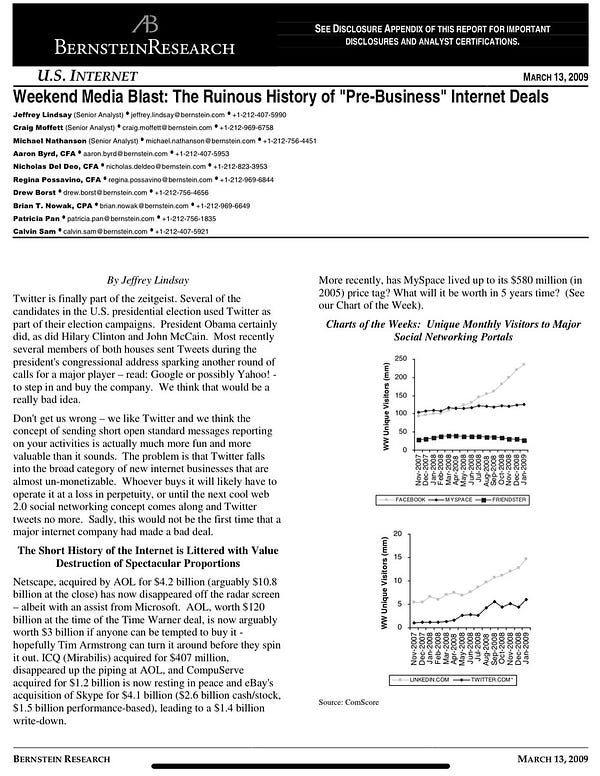
Bubbles II.
Escape your bubble by Nick Maggiulli.
I think I need a daily reminder of this. What I perceive is but a tiny sliver of reality. Web3 and crypto topics invaded my brain this fall. Meanwhile, I’m nearly oblivious to politics and much of the daily news flow. It’s going to be an interesting Christmas!
“It’s the difference between what I think about on a day-to-day basis and what the rest of my family tends to think about. It’s like we are living in different universes.”
“But they weren’t discussing money. Not at all. Yet whenever I glanced at Instagram or Twitter I came face to face with my reality. Even on Thanksgiving day people were out hawking money advice. … It made me realize how biased my worldview is. It made me realize how much my career had influenced my thinking.”
“Because we all live in bubbles. Some of these bubbles are made of money. Some are made of power. Some of pride. Some of hate. Some of lust. Some of loss. The question isn’t whether you are in a bubble, but how often do you get out of it? How often do you escape your bubble to see the world in a different light?"
If you enjoyed this piece, could you please do me a favor that costs you nothing? Please consider simply clicking the “like” button when you are done reading. New readers look at the number of likes as an indicator of whether to subscribe and spend more time reading a Substack. My last piece, the conversation with William Green, was viewed more than 12,500 times and had 11 likes. I know it’s a silly metric but I think doubling or even tripling the number of likes would encourage more people to read and become subscribers. It’s up to you. But pressing the heart at the end of a piece costs you nothing and would make my day. Thank you all for reading.❤

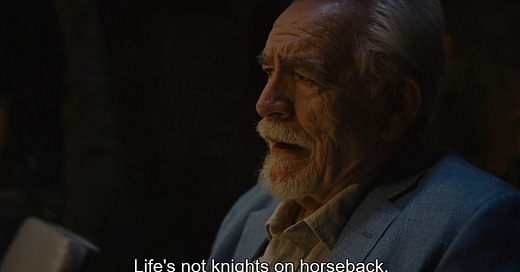



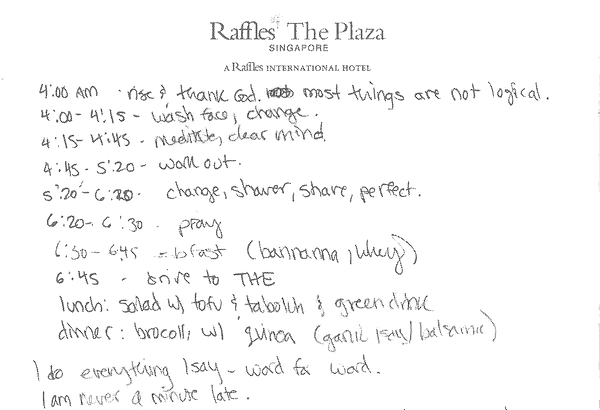
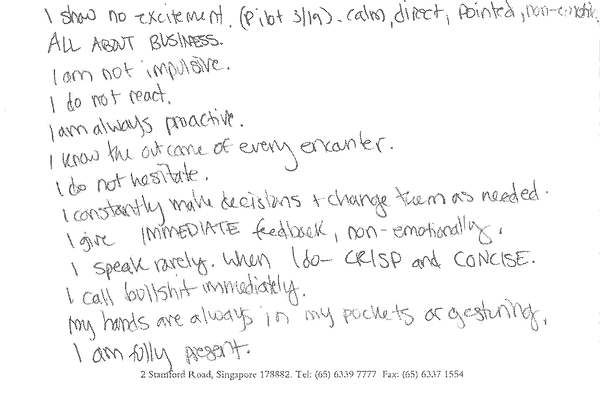


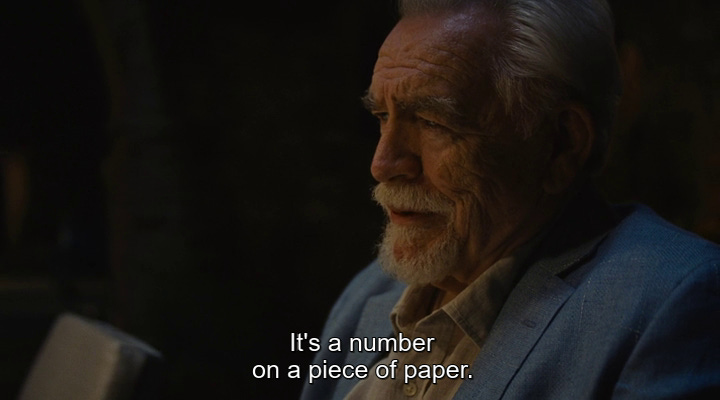
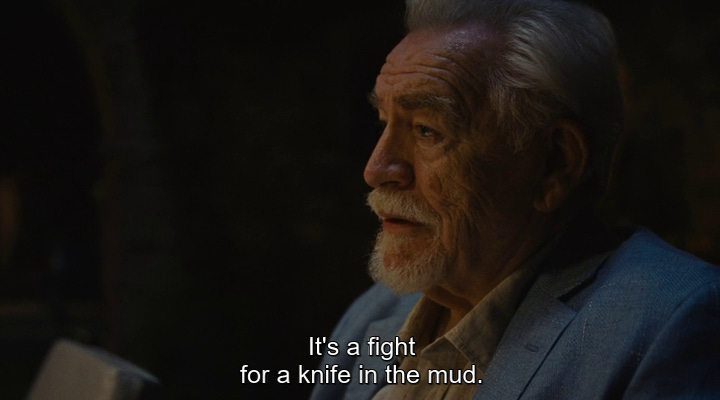

Wow this letter was long, in a good way. But I thought I was done after the Succession bit.
This could have been 3 posts. That way you give yourself some time during your visit to ze Germans.
Excellent